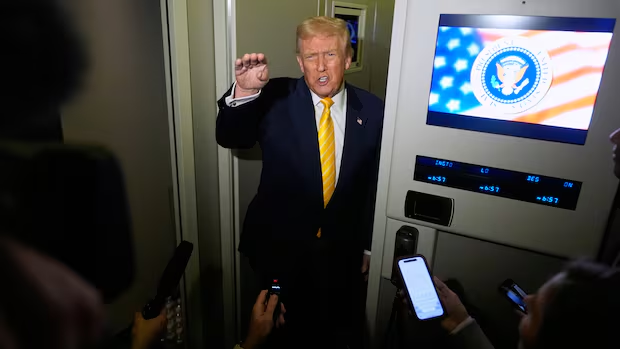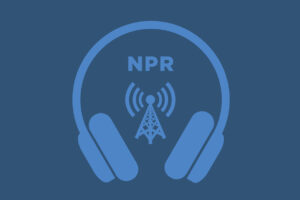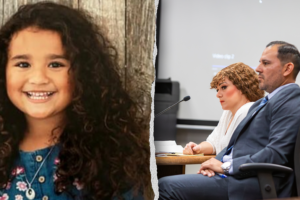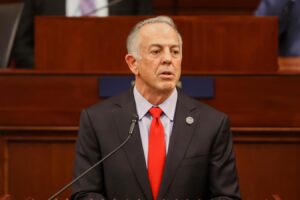
Not smart enough. A terrible person. Obnoxious.
These are just some of the more recent insults U.S. President Donald Trump has publicly hurled at female reporters in response to their questions.
But calling Bloomberg’s Catherine Lucey “piggy” on Air Force One, and then berating ABC News’ Mary Bruce a few days later, has raised questions about just how much journalists are expected to tolerate as they do their jobs.
As some industry experts have pointed out, the issue goes well beyond these two incidents, or even Trump, who has a history of both attacking the press and calling women pigs.
“These incidents are not isolated; they are part of an unmistakable pattern of hostility — often directed at women — that undermines the essential role of a free and independent press,” the Society of Professional Journalists posted in an online statement on Wednesday.
WATCH | Trump says ‘quiet, piggy’ to a reporter:
‘Quiet, piggy’: Trump cuts off reporter on Air Force One
In an excerpt from a news scrum aboard Air Force One on Friday, U.S. President Donald Trump tells Bloomberg reporter Catherine Lucey ‘quiet, piggy’ as she asks about the Epstein files.
There are also ripple effects, experts say, with studies showing that high-level political leaders are some of the biggest instigators of online violence against female reporters and that there’s a growing tolerance for political bullying of the press.
Trump has been attacking journalists for years, and he “very much directs his ire at women, and usually women journalists of colour,” Elisa Lees Muñoz, executive director of the International Women’s Media Foundation (IWMF), told CBC News.
“With the obvious intention of shutting them up. Shutting them up on the spot,” Muñoz said.
“It’s a well-known playbook. It’s meant to incite. And it’s meant to send a message to everyone around these women: Next time it’s going to be you.”
‘Quiet, piggy’
Last Friday, during a news conference aboard Air Force One, Trump snapped at Bloomberg’s Lucey as she asked a question about the release of the Department of Justice documents related to the late sex offender Jeffrey Epstein.
“Quiet!” Trump said. “Quiet, piggy.”
As some critics have pointed out, it wasn’t just the insult that was shocking but that no one else in the scrum defended Lucey. That’s largely because other journalists “fear becoming next on his list,” the Guardian writes.
The silence from every other reporter in that room is deafening. It tells you everything you need to know about the state of the free press.
—ItsThomAnt
The Society of Professional Journalists (SPJ) notes Trump routinely uses “demeaning language” to discredit women doing their jobs. And as the IWMF’s Muñoz points out, there’s hardly any recourse for journalists who are insulted by the president.
Bloomberg did not respond to CBC News’ question about whether it would consider a complaint or another avenue of recourse.
“Our White House journalists perform a vital public service, asking questions without fear or favour. We remain focused on reporting issues of public interest fairly and accurately,” a Bloomberg spokesperson said in a written statement.
Several media outlets reported that the White House defended Trump’s insult in a statement from an unnamed official, saying, “This reporter behaved in an inappropriate and unprofessional way towards her colleagues on the plane. If you’re going to give it, you have to be able to take.”
‘You’re a terrible person’
On Tuesday, during a press availability with Saudi Crown Prince Mohammed bin Salman, Bruce of ABC News asked a question about the murder of U.S. resident and Saudi citizen Jamal Khashoggi.
Khashoggi, a Washington Post columnist and critic of the Saudi royal family, was killed at the Saudi consulate in Istanbul in 2018. U.S. intelligence said bin Salman ordered the killing.
Trump cut Bruce off, demanding to know where she worked, then called ABC “fake news” and added, “You don’t have to embarrass our guest by asking a question like that.” Later, he referred to her question as “a horrible, insubordinate, and just a terrible question.”
WATCH | Trump slams ABC reporter for asking about Khashoggi:
Trump claims Saudi Arabia’s crown prince didn’t know about Khashoggi murder
U.S. President Donald Trump on Tuesday lashed out at an ABC News reporter who asked about Saudi Crown Prince Mohammed bin Salman’s connection to the 2018 murder of slain Washington Post columnist Jamal Khashoggi. During their meeting at the White House, Trump claimed the crown prince had no knowledge of Khashoggi’s killing, which took place inside Saudi Arabia’s consulate in Istanbul, contradicting U.S. intelligence about bin Salman’s role in the murder.
When Bruce, who is ABC’s chief White House correspondent, asked a question about the Epstein files, Trump made his attacks personal.
“You know, it’s not the questions that I mind. It’s your attitude. I think you are a terrible reporter,” Trump said. “You’re all psyched up…. You’re a terrible person and a terrible reporter.”
CBC News requested a comment from the White House Correspondents’ Association and has not yet heard back. Bruce, while not specifically commenting on the exchange, thanked a handful of colleagues who supported her on the social media platform X.
“When reporters ask hard questions about the murder of a fellow journalist, that is not an embarrassment. What’s embarrassing is a leader trying to silence those questions,” the SPJ wrote in its statement.
‘Chilling’ and ‘not normal’
Trump’s attacks on the media are nothing new. He referred to the press as the “enemy of the American people” shortly after first taking office in 2017, an era marked by his frequent criticisms that journalists and their reports were “fake news.”
His derogatory comments about female journalists also date back, including in 2015, when he said Fox News host Megyn Kelly had “blood coming out of her wherever.”
But for these two most recent insults to happen back to back is “chilling,” especially with the timing of Trump’s meeting with bin Salman, the IWMF’s Muñoz said.
Trump points at a reporter as he meets Saudi Crown Prince Mohammed bin Salman in the Oval Office of the White House, in Washington, D.C., on Tuesday. (Evan Vucci/The Associated Press)
The Poynter Institute’s Tom Jones wrote in an editorial on Thursday that while Trump’s attacks aren’t new, “they’re not normal, either.”
Lucey and Bruce’s questions about the Epstein files and Khashoggi were fair and didn’t come out of nowhere, Jones said, yet Trump appeared rattled by them and lashed out.
“It is incredibly rare for a president to act with such ill will toward reporters and media outlets. And just because it has become a normal part of the current president’s routine does not mean that it should be normalized,” he wrote.
But where does that leave journalists? The SPJ urged the public to hold all elected officials accountable for freedom of the press, saying attacks on press freedom “chip away at our democracy.”
And Muñoz said while there’s very little legal recourse, media organizations can ask themselves how much they’re willing to put up with.
“Collective action is really what’s needed here, because one journalist at a time cannot stand up to the president of the United States.”
WATCH | Where does Trump’s pressure on U.S. media end?:
Trump’s pressure on U.S. media: Where does it end?
ABC’s suspension of Jimmy Kimmel Live! is just the latest response from a large U.S. media company to pressure from the Trump administration. Industry observers wonder, where does it end?
Source





